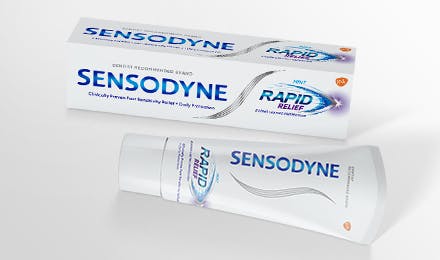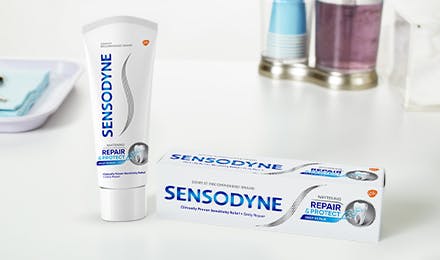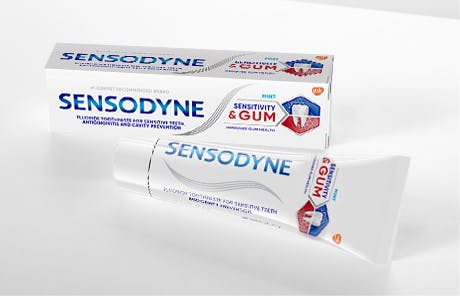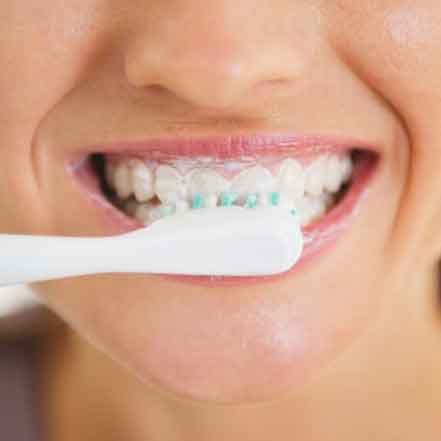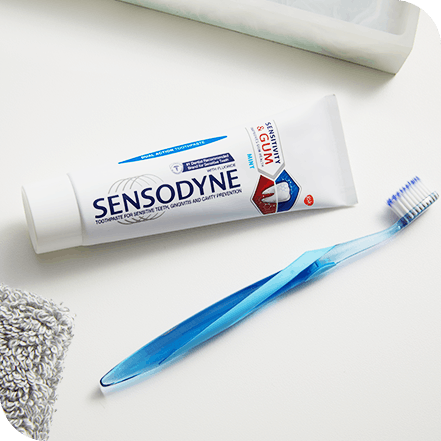What Can a Dentist Do for Sensitive Teeth?

If you feel pain after a hot bowl of soup, or an ice cream cone on a hot day, you’re experiencing tooth sensitivity, or “dentin hypersensitivity.” This is a common dental issue that feels like sharp, temporary pain or discomfort.1 If you’re experiencing this, you’re not alone. Depending on the severity of your sensitive teeth, your dentist can discuss many procedures with you that can help find relief from sensitivity.
Why Do My Teeth Feel Sensitive?
Sensitive teeth are typically the result of worn tooth enamel or exposed tooth roots.2 Tooth discomfort can also be caused by other factors like cavities, cracked or chipped teeth, worn fillings or gum disease.2 Oftentimes, a dental procedure can result in temporary sensitive teeth, especially after fillings, teeth cleanings and dental restoration placement.3 This sensitivity usually disappears in four to six weeks.3
Additional causes of tooth sensitivity may include:1
- Brushing too hard
- Teeth whitening products
- Acidic foods
- Age
- Plaque buildup
- Teeth grinding
Dentist Treatments and Recommendations for Sensitive Teeth
If your sensitive teeth are bothering you, visit a reputable dentist, who can identify any underlying causes of your tooth pain.2 It’s important to consult with a dental professional to determine the underlying cause of your tooth sensitivity and to discuss the most appropriate treatment options for your specific situation.
Here are some of the most common ways your dentist can help those with dentin hypersensitivity:
Fluoride treatments
Your dentist might apply fluoride directly to the sensitive areas of your teeth to strengthen tooth enamel and reduce pain; you may get a prescription of fluoride to apply at home via a custom tray.2
Surgical gum graft
If your tooth root has lost gum tissue, a small amount of gum tissue can be taken from elsewhere in your mouth and attached to the affected site.2 This can protect exposed roots.2,
Root canal
If your sensitive teeth are causing severe pain, your dentist might recommend a root canal, which is a procedure used to treat problems in the tooth's soft core (dental pulp) if other treatments aren’t effective.2
Root surface treatments
Depending on the severity of your sensitive teeth, your dentist may apply dental bonding, fluoride varnishes, or dentin sealers to the exposed root surface.3
Lifestyle changes
Your dentist may recommend changes to your oral hygiene routine, such as using a soft-bristled toothbrush and avoiding aggressive brushing techniques.1 Additionally, avoiding acidic foods and drinks, quitting smoking, or addressing teeth grinding or clenching habits can also help alleviate tooth sensitivity.1
Toothpastes for sensitive teeth
Use a toothpaste specifically designed for sensitive teeth, like Sensodyne Rapid Relief toothpaste. Sensodyne Rapid Relief delivers proven pain relief in as little as three days (when used twice daily). It’s the number one dentist recommended toothpaste brand for sensitive teeth.


